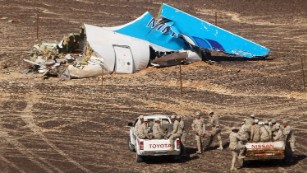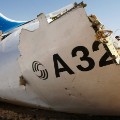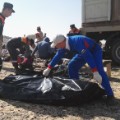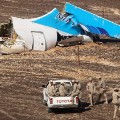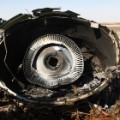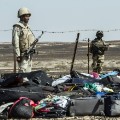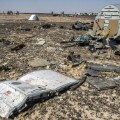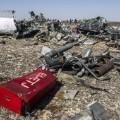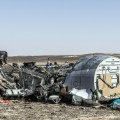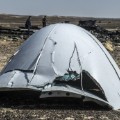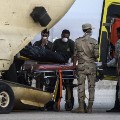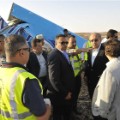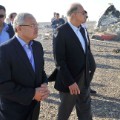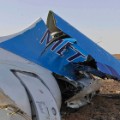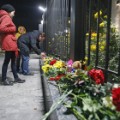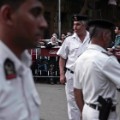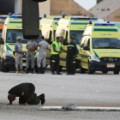Several senior administration officials in the intelligence, military and national security community told CNN the United States is almost positive a Russian passenger jet was brought down by a bomb.
How convinced are they?
One official said “it’s 99.9% certain.”
Another official told CNN on Saturday: “We believe it was likely brought down by a bomb.”
Russia-bound Metrojet Flight 9268 crashed in Egypt’s Sinai Peninsula last weekend, killing all 224 people aboard.
The evidence that it might have been a bomb centers to a large extent on British and U.S. intercepts of chatter after the crash from the ISIS affiliate in Sinai to ISIS operatives in Syria around Raqqa.
U.S. and British intelligence have been analyzing the specific language in the chatter to determine to what extent the operatives were talking about the type of bomb and detonator used, and whether that language was a true representation of what happened, one official told CNN.
Several officials said it’s the specificity of the chatter that has directly contributed to the U.S. and British view that a bomb likely was used.
Egypt considering all possibilities
Egyptian officials gave the impression Saturday they are not ready to say there was a bombing.
A noise was heard in the final second of the cockpit voice recording on Metrojet Flight 9268 as it ascended on autopilot before apparently breaking up about 23 minutes after takeoff, the head of Egypt’s investigation said Saturday.
No conclusion as to what brought down the flight has been reached, Ayman al-Muqaddam told reporters.
“All the scenarios are out on the table,” he said. “We don’t know what happened exactly.”
In-flight breakup
European investigators who analyzed the two flight recorders are saying the crash is not an accident, CNN affiliate France 2 reported Friday.
Muqaddam said Egyptian authorities have not been provided any information or evidence tied to reports suggesting that a bomb took down the flight. He urged the sources of the reports to pass along related evidence to Egyptian investigators.
Muqaddam did not describe the noise investigators picked up from the cockpit voice recorder when the flight disintegrated midair while traveling at 281 knots (323 mph) at about 30,000 feet and climbing.
“A spectral analysis will be carried out by specialized labs in order to identify the nature of this noise,” he said.
The investigation includes experts from Egypt, Russia, France, Germany and Ireland. In recent days the probe has been hampered by bad weather, Muqaddam said.
Debris from the plane was scattered over an area more than 13 kilometers long, suggesting an in-flight breakup, according to Muqaddam.
“Maybe it’s a lithium battery, maybe it’s an explosion, maybe it’s … a mechanical issue,” he said the possible cause of the crash.
Egyptian Foreign Minister Sameh Shoukry said the international community had not heeded Egypt’s calls to deal seriously with terrorism.
Other countries “did not show a level of cooperation and direct targeting of these organizations that we hoped for,” Shoukry said. “I can say these calls were not heeded by many of the parties who are now working to protect the interests of their citizens.”
While couched as a complaint, the statement appeared to mark a significant reversal for Egypt, where officials, perhaps concerned about the fate of the tourist industry, had spent a week rejecting the idea that the Russian plane fell victim to terrorism.
Homeland Security Secretary Jeh Johnson told CNN’s Barbara Starr that officials were taking “precautionary interim steps” to increase security on international flights into the United States during the investigation of the Egypt air disaster.
“ISIL is out there now active in a lot of different areas and, while this investigation is pending and because we have this group claiming responsibility, we believe it’s significant to do these things on an interim basis,” he said, referring to claims of responsibility by the Sinai branch of the terror group also known as ISIS.
Johnson said authorities are evaluating whether additional measures were necessary.
DHS chief seeks to reassure American fliers after downing of Russian plane
Egypt’s announcement
Russian President Vladimir Putin suspended Russian air traffic with Egypt on Friday until the cause of the crash is determined, the Kremlin said.
The United States and Britain shared their intelligence with Russia before Putin decided to suspend flights, Kremlin spokesman Dmitry Peskov told CNN’s Matthew Chance.
Putin spoke with Egyptian President Abdel Fattah el-Sisi about the security situation in Egypt.
“The two leaders agreed to strengthen cooperation between the relevant security authorities in the two countries,” el-Sisi’s office said.
Russia’s resistance
Russia had resisted the theory that a bomb brought down the airliner, but with Friday’s indefinite suspension of flights it seemed to be moving toward acceptance of the speculation.
The jet, carrying mostly Russian families returning from Red Sea vacations, was 23 minutes into its flight last Saturday from Sharm el-Sheikh to St. Petersburg when it disappeared from radar over the Sinai Peninsula.
A U.S. satellite detected a heat flash over Sinai. The plane broke apart and fell 30,000 feet. All aboard died.
Russia’s about-face buttressed a theory about the cause of the crash. As investigators pick through the rubble of the Russian airliner, and as Western officials sift through their own intelligence reports, some suspect Flight 9268 was brought down by a bomb planted in its hold.
And some believe think the bomb may have been smuggled on board in the Egyptian resort of Sharm el-Sheikh, from which the flight departed.
Since Friday, 1,200 Russian citizens have been evacuated from Egypt on 6 planes, Russian state broadcaster Russia 24 reported, quoting Oleg Safonov, the chief of Russia’s Federal Agency for Tourism Oleg Safonov. The channel reported that the Egyptian military checked the passengers before they boarded the planes.
About 80,000 Russian tourists remain in Egypt, with 79,000 of them in Hurghada and Sharm el-Sheikh, he said. Hurghada, like Sharm el-Sheikh, is a Red Sea tourist city.
And UK officials were “urgently” working with Egyptian authorities on “permanent measures that will allow British tourists to come back to Sharm el-Sheikh as soon as possible,” the British Embassy in Cairo said Saturday. The embassy statement said “Britain is not evacuating its tourists early from their holidays.”
Opinion: What’s at stake for Putin in investigation
Bomb theory
The bombing theory emerged Wednesday, when Britain suspended flights from Sharm el-Sheikh to the United Kingdom because of security fears.
It gained currency when it was expressed publicly by British Prime Minister David Cameron and U.S. President Barack Obama, though neither called it a certainly.
Talks between the United States, Egypt and Russia could result in the FBI providing some experts, particularly bomb technicians, to assist in the investigation, according to a U.S. official.
Cameron said it was “more likely than not” that the cause of the crash was an onboard bomb. Obama said it was “certainly possible.”
If plane was bombed, where might suspicion fall?
Does downing of plane mark ISIS’ emergence as global threat?




